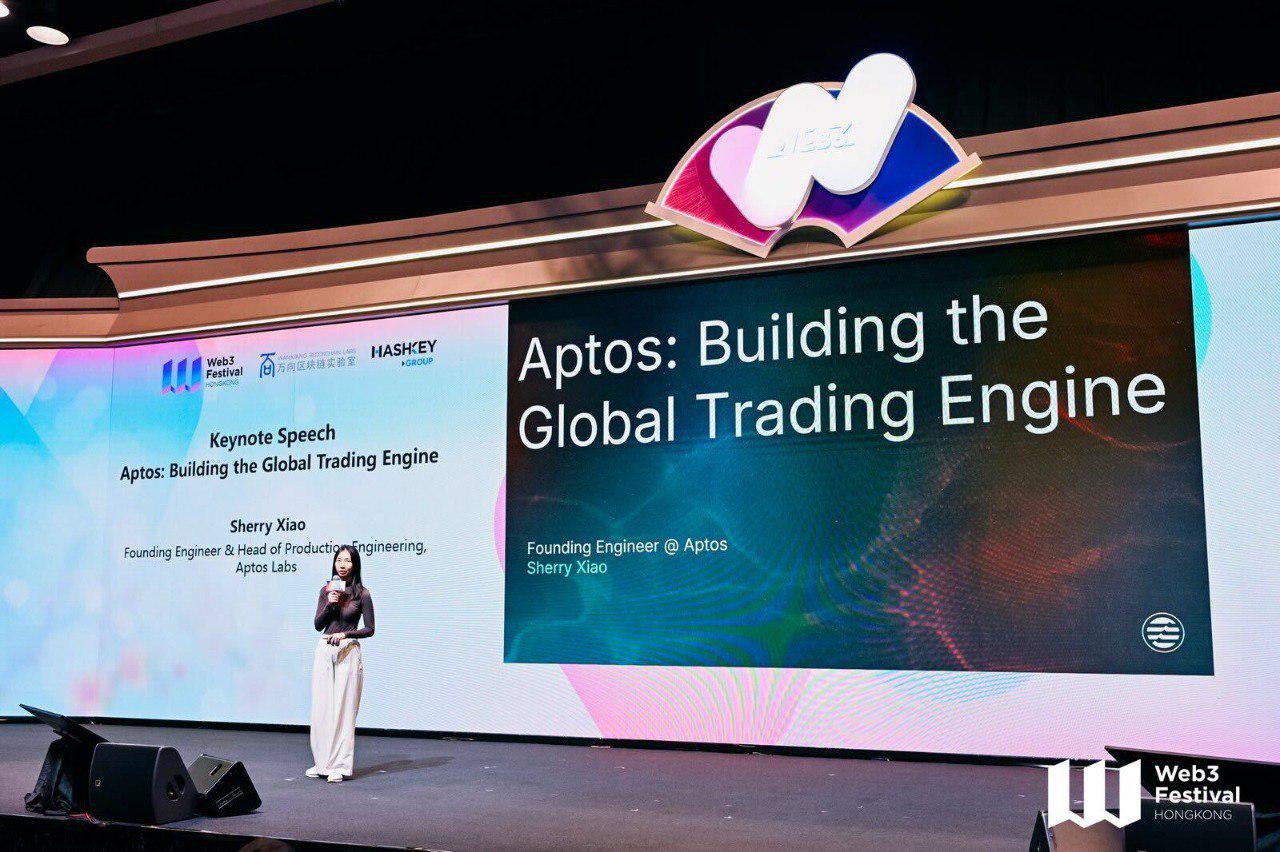Exclusive interview with Sherry, the founding engineer of Aptos: Meta Blockchain "OG"'s technical journey to build a "global trading engine"

Interview: Tong, PANews
Editor: Yuliya, PANews
Against the backdrop of increasingly fierce competition in the public chain, Aptos is steadily moving towards the strategic positioning of "global trading engine" by relying on technological innovation and ecological expansion. Since the total locked volume (TVL) exceeded US$1 billion for the first time in November last year, Aptos reached US$1.03 billion at the end of March. In addition, the market value of stablecoins also exceeded US$1 billion for the first time on March 24, an increase of more than ten times year-on-year, demonstrating strong ecological appeal and capital carrying capacity.
In this context, Aptos has not only achieved continuous iterations at the technical level, but also made a number of breakthroughs in ecological construction: Aave completed its first non-EVM environment test network deployment, and DeFi activity has increased significantly. In order to meet the rapidly growing transaction needs, the Aptos team continues to promote technical solutions such as Zaptos and Shardines, accelerate the construction of the underlying architecture that supports millions of TPS, and strengthen its core advantages in performance, stability and user experience.
Under this trend, PANews conducted an in-depth conversation with Sherry Xiao, an early founding engineer of Aptos, to discuss key issues such as the technical architecture of the global trading engine, ecological expansion strategy, and developer support, to gain insight into how Aptos, with technology as the basis and ecology as the support, can stand out in the new round of public chain competition.
High-performance public chain created by Meta "OG"
PANews: Please tell us about your background and role at Aptos.
Sherry: I am Sherry Xiao, one of the early founding engineers of Aptos. Before joining Aptos, I worked as an engineer at Instagram, mainly responsible for scalability architecture. Later, I joined the Libra/Diem team of Meta (formerly Facebook), responsible for verification nodes and infrastructure construction, helping Mastercard, Visa, PayPal, eBay and other institutions to deploy verification nodes.
When the Libra project encountered policy obstacles, our entire team followed our leaders to start a business in 2022 and founded Aptos. In fact, there are many talents coming out of Facebook's blockchain team. Some joined Sui, some joined the a16z encryption team, and some created other entrepreneurial teams, such as Lightspark founded by David Marcus. It can be said that Facebook has provided a large number of talents for the Web3 industry.
PANews: As an engineer, how do you evaluate the advantages of Move language compared to other smart contract languages?
Sherry: For people with an engineering background, switching languages is commonplace. The Move language is developed based on Rust. Its biggest advantage is that it was designed for smart contracts from the beginning. It has many guarantees in asset management and security, and provides formal verification tools.
Compared with Solidity and EVM, Move can effectively avoid many common security vulnerabilities and reduce the risk of capital loss. The Move prover tool also allows developers to verify the correctness of smart contracts written in the Move programming language. In addition, Move provides innovative features such as dynamic distribution, account abstraction, and permission signatures, allowing developers to build more advanced products.
For developers who understand programming languages and data structures, learning Move is not as difficult as imagined, because the basic principles of programming are the same.
PANews: What bottlenecks in the current technological infrastructure still need to be iterated?
Sherry: Overall, I think there is still a lot of room for improvement in the developer experience and user experience of Web3. Take Aptos as an example. The infrastructure is already quite complete, and its throughput, speed and gas fee have all dropped to very low levels, but how to provide unique features on the chain for developers to create outstanding products is still a big challenge.
We are working on ZK-based login solutions and innovations in privacy protection. Because user privacy is an important consideration if large-scale payments are to be achieved. We recently launched a project in the open source code base that can hide transaction details. Users can only know that a transaction has occurred between Alice and Bob, but cannot see the specific amount and balance. This technology combines privacy protection and blockchain decentralization to create interesting products.
PANews: Aptos focuses on high-performance blockchain. Compared with other public chains, what are its unique advantages in scalability?
Sherry: Scalability is our core strength. As an engineering team from Facebook, we have extensive experience in building highly scalable systems and have been responsible for large-scale infrastructure such as Instagram and Facebook.
Aptos is designed to be very modular, with each module having its own expansion space:
-
At the consensus level, our newly released Raptr is the most advanced consensus algorithm implementation in the industry, taking parallelization to the extreme;
-
At the execution level, our Block-STM technology is also industry-leading. Many newly released public chains and L2s are using this technology, such as Movement, Monad, Polygon, etc.
-
In terms of storage, we have implemented sharding technology and will continue to research sharding technology and related caching layers in the future to further improve system performance.
These technologies are open source, and the community is welcome to use Aptos' technology. But even if other chains copy our technology, there will be delays. For example, when they are still using Block-STM V1, we are already working on V2; when they follow up, we have launched the performance optimization of Move 2.0. So it is a wiser choice to develop directly on Aptos.
Ecosystem layout: stablecoins, transactions and DeFi
PANews: Aptos’ on-chain data performed well, with the number of accounts exceeding 47 million and weekly transaction volume exceeding 39 million. Where does this progress come from?
Sherry: Our ecological layout mainly focuses on several aspects:
First of all, in terms of infrastructure construction, we have natively supported the three major stablecoins, USDT, USDC and USDE. Users generally report that transfers on Aptos are very smooth, and on-chain peer-to-peer payments have become one of our major advantages.
Secondly, we have partnered with institutions such as Franklin Templeton to launch multiple RWA projects on the chain.
At the beginning of this year, we announced a $2 million ecosystem fund to incentivize community building and support different DeFi protocols and projects. This also promoted the growth of DEX trading volume and on-chain activities.
In addition, we have launched the LFM program to help ecological projects plan roadmaps, conduct token generation events (TGE), connect with exchange resources, obtain venture capital, and provide marketing and KOL guidance. These efforts have enabled our ecosystem to achieve steady growth over the past period of time.
PANews: Is it true that the Hong Kong stablecoin HKDA may be issued on Aptos? What plans do you have for compliance development in Hong Kong?
Sherry: Aptos is the only L1 blockchain platform participating in the Hong Kong e-HKD project, and we have been actively participating in related discussions. We maintain close communication with banks and government departments in Hong Kong, and BCG is also our partner.
We also have a lot of innovative collaborations with Hong Kong Cyberport. Our official community organization Movemaker just held a hackathon event at Cyberport a few weeks ago, hoping to foster local projects.
Although we do not have a large office in Hong Kong, we have set up a co-creation space Aptos Space in the core area of Hong Kong through Movemaker to provide a place for builders to collaborate and gather, and actively organize offline events to attract Web3 talents. We attach great importance to the activeness of the developer ecosystem in the Asia-Pacific region, because many high-quality ecological projects come from the Chinese-speaking region. Our layout in the Asia-Pacific region will become more and more in-depth, and we will invest more resources to continue to achieve more cooperation in this region and promote better development teams to join our ecosystem.
PANews: In the current market environment, which areas of projects will Aptos focus on supporting in its ecosystem?
Sherry: As can be seen from our recently released global trading engine, trading-related tracks are a direction we attach great importance to. We focus on payment, stablecoin application scenario expansion, and DeFi track, especially the leading projects of DeFi "three-piece set" (DEX, lending, and liquidity pledge).
We also hope to work closely with large institutions and partners with distribution channels. Aptos has obvious advantages in transfers - low latency and low cost, which is very suitable for large-scale payment business. We are also paying attention to the combination of games and DeFi, as well as the application scenarios of AI agents and transactions.
PANews: Aptos recently announced the creation of a global trading engine. How will this vision be realized?
Sherry: Over the past few years, we have been deploying the infrastructure of the global trading engine. We believe that the infrastructure of blockchain has been solved quite well, and we are now focusing on innovation at the user experience level:
-
For example, Keyless is a zk-based technology that allows users to log in directly using Google, Facebook, or Apple accounts, solving the pain points of private key management and mnemonic phrase memory;
-
We implemented account abstraction and permission sign functions, allowing DeFi developers to better control user authentication and onboarding processes;
-
In the Move language, we have added functions such as dynamic script and dynamic dispatch to help DeFi or trading applications achieve functional innovation.
These technology dots connect to form our vision: to build a global trading engine and invite developers to use this infrastructure to create innovative applications.
Talent cultivation: developer ecosystem construction and university cooperation
PANews: With AI becoming a hot topic, how does Aptos attract and retain developers?
Sherry: It is true that developers are attracted to popular fields, but each application scenario has its own developer base. Even when AI is hot, there are still many developers interested in cryptography, decentralization, and blockchain, which are features that AI cannot satisfy.
For developers, the most important thing is to see the possibilities of the future, not just short-term speculation. Developers all have dreams and hope to create products that can be widely used. As long as we can let them see the market prospects, needs and opportunities, we can attract developers to continue to work in the blockchain field.
PANews: What measures has Aptos taken to cultivate talents in colleges and universities?
Sherry: We attach great importance to talent cultivation in universities. As a team of Facebook engineers, we know that universities are the largest talent pool. We have in-depth cooperation with the blockchain associations of Stanford University and Berkeley University, and we also have cooperative projects with SMU in Singapore and Tsinghua University in China.
We work with professors to design blockchain courses so that students can directly learn Aptos technology and use Aptos as their first lesson in blockchain. Most of our company's engineers have doctoral degrees, and they often give lectures at universities such as MIT and UC to attract outstanding developers to join the community.
At the recent hackathon in Hong Kong, teams from Zhejiang University and Tsinghua University Blockchain Association presented excellent projects, and we look forward to their future growth.
PANews: What are your personal expectations for the future development of Web3?
Sherry: My personal vision and that of the entire team is still focused on transactions and payments. Since the Libra project began, we have hoped to build a global financial infrastructure so that more people can enjoy the convenience of a modern financial system.
I am particularly looking forward to seeing innovative payment projects combined with stablecoins. For example, streaming payment can be fully realized on Aptos - working every second and getting paid every second, which is something that traditional financial institutions cannot do.
Migrating traditional payment software to the chain and combining it with privacy protection features can create exciting new scenarios. These innovative applications are the key to truly promoting the popularization of blockchain technology.
PANews: What impact will the recent changes in the team’s senior management have on Aptos?
Sherry: Personnel changes are normal for many teams. For the team, this is actually a good opportunity to re-examine past plans and make adjustments. In the past, we have been working hard, and this change has allowed us to unite and think about the future layout direction.
You May Also Like

Humans Are the Improbability Drive AI Can’t Copy

JPYC Launches Japan’s First Yen-Denominated Stablecoin to Drive Digital Payment Growth
Highlights: Japan’s JPYC Inc. launches yen-based stablecoin to modernize payments and strengthen its position in digital finance. Analysts predict JPYC will accelerate Japan’s transition toward a fully digital economic ecosystem. The stablecoin seeks to enhance transaction efficiency and support blockchain-based business growth. On October 27, Japanese fintech firm JPYC Inc. officially announced the launch of the country’s first stablecoin pegged to the Japanese yen, JPYC. It marks a small but meaningful step in a country where most consumers still rely on traditional payment methods such as cash and credit cards. The rollout follows approval from Japan’s Financial Services Agency. Growing institutional interest also signals a shift in the country’s long-standing cash-based economy. JPYC is fully backed by yen deposits and Japanese government bonds. It complies with Japan’s Payment Services Act and maintains 100% reserves. The stablecoin is pegged 1:1 to the Japanese yen and operates on major blockchains such as Ethereum, Avalanche, and Polygon. CEO Noritaka Okabe said the company wants to support innovation by offering startups lower transaction and settlement costs. He added that better global connectivity could help everyone and that the company is open to new partnerships. JPYC Inc announced the official launch of its yen-denominated stablecoin, JPYC, along with the release of its dedicated issuance and redemption platform, JPYC EX. The stablecoin is pegged 1:1 to the Japanese yen and fully backed by bank deposits and government bonds. Initial… — Wu Blockchain (@WuBlockchain) October 27, 2025 User Access and Growth Targets The company said users can buy JPYC on the JPYC EX platform after verifying their identity with the My Number card, Japan’s national ID. JPYC Inc. plans to reach 10 trillion yen ($65.4 billion) in circulation within three years. It also aims to add more blockchains and partner with more businesses. For comparison, USDT, the largest stablecoin, has about $183.2 billion in supply. Several Japanese firms plan to integrate JPYC into their operations, the company confirmed. Fintech developer Densan System is creating payment systems for retail and e-commerce platforms featuring JPYC. Meanwhile, Asteria will add JPYC support to its enterprise data integration software, used by more than 10,000 businesses. Additionally, crypto wallet provider HashPort plans to enable JPYC transactions on its platform. With its launch, JPYC becomes the first major stablecoin not tied to the U.S. dollar but backed by a strong economy. This move may change how money flows across Asia. Like U.S. stablecoins that increased Treasury demand, Japan’s version could boost JGB demand and add diversity to the market. The global stablecoin market is now over $286 billion, with nearly all linked to the dollar. Digital Payment Shift in Japan Japan’s use of digital payments has grown, which shows a big shift from cash to electronic payments. JPYC aims to speed up this growth by offering a simple and low-cost digital option. The company will waive transaction fees at first and earn from interest on Japanese government bond holdings. Meanwhile, Japan’s three major banks, Sumitomo Mitsui, Mitsubishi UFJ, and Mizuho, plan to launch a joint yen-based stablecoin system on October 31 for corporate settlements through MUFG’s Progmat platform. Japan’s Major Banks Launch Yen-Backed Stablecoin Partnership Japan’s financial sector is taking significant steps toward integrating cryptocurrency technologies, with three major banks planning to jointly issue a yen-pegged stablecoin. This initiative…… pic.twitter.com/WR99AIb4ah — Crypto Breaking News (@CryptoBreakNews) October 17, 2025 Bank of Japan Deputy Governor Ryozo Himino recently said that stablecoins could become an important part of the global payment system and may partly replace traditional bank deposits. Experts believe yen-backed tokens could grow in use over the next two to three years. They may also play a role in areas like decentralized finance, tokenized assets, and cross-border payments. eToro Platform Best Crypto Exchange Over 90 top cryptos to trade Regulated by top-tier entities User-friendly trading app 30+ million users 9.9 Visit eToro eToro is a multi-asset investment platform. The value of your investments may go up or down. Your capital is at risk. Don’t invest unless you’re prepared to lose all the money you invest. This is a high-risk investment, and you should not expect to be protected if something goes wrong.
